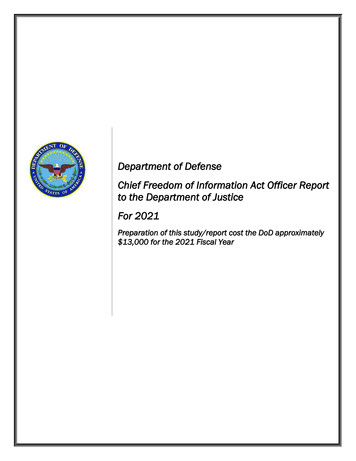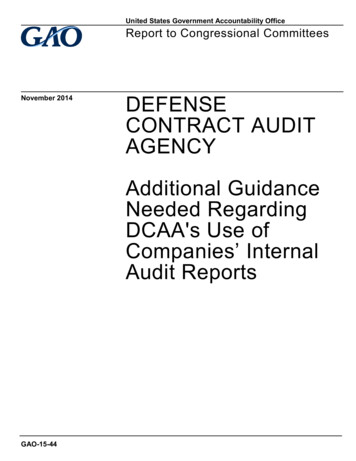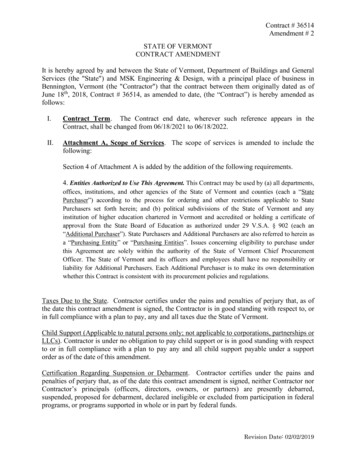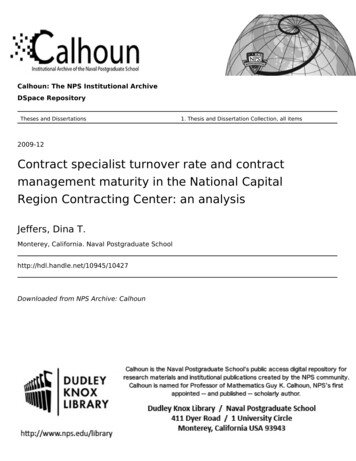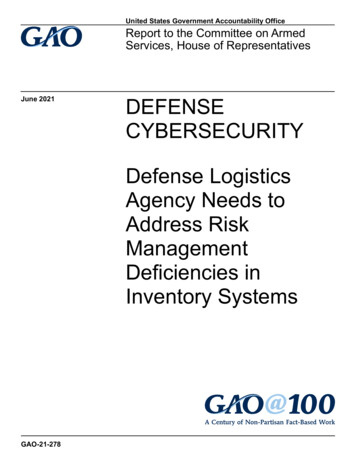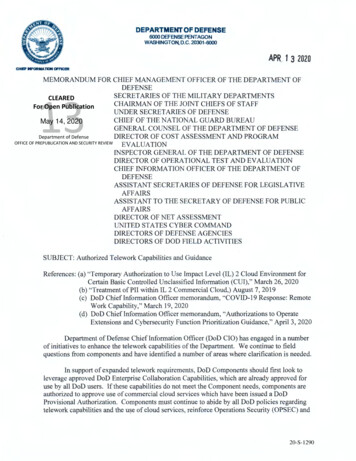
Transcription
Report No. DODIG-2015-139I nspec tor Ge ne ralU.S. Department of DefenseJUNE 29, 2015Evaluation of Defense ContractManagement Agency ContractingOfficer Actions on ReportedDoD Contractor EstimatingSystem DeficienciesI N T E G R I T Y E F F I C I E N C Y A C C O U N TA B I L I T Y E X C E L L E N C E
I N T E G R I T Y E F F I C I E N C Y A C C O U N TA B I L I T Y E X C E L L E N C EMissionOur mission is to provide independent, relevant, and timely oversightof the Department of Defense that supports the warfighter; promotesaccountability, integrity, and efficiency; advises the Secretary ofDefense and Congress; and informs the public.VisionOur vision is to be a model oversight organization in the FederalGovernment by leading change, speaking truth, and promotingexcellence—a diverse organization, working together as oneprofessional team, recognized as leaders in our field.Fraud, Waste & AbuseHOTLINEDepartment of Defensedodig.mil/hotline 8 0 0 . 4 2 4 . 9 0 9 8For more information about whistleblower protection, please see the inside back cover.
Results in BriefEvaluation of Defense Contract Management AgencyContracting Officer Actions on Reported DoD ContractorEstimating System DeficienciesJune 29, 2015Finding (cont’d)Objectivetime the Government was unable to rely on the contractors’proposed cost estimates for future Government work. Inaddition, in 5 of 18 cases, contracting officers failed towithhold payments from contractor billings for uncorrecteddeficiencies, as DFARS 252.242-7005(e) requires whenincorporated in a contract. Without a payment withhold,contractors may lack the incentive to timely correct significantestimating system deficiencies.We evaluated the Defense ContractManagement Agency (DCMA) actions onDoD contractor estimating system deficienciesreported in 18 Defense Contract AuditAgency (DCAA) audit reports. Our objectivewas to assess the DCMA contracting officer’scompliance with the Defense FederalAcquisition Regulation Supplement (DFARS)requirements for reported estimatingsystem deficiencies.FindingFor 17 of 18 reports, DCMA contractingofficer actions did not comply with one ormore DFARS requirements involving reportedestimating system deficiencies. Specifically,the contracting officers did not: issue timely initial andfinal determinations on thereported deficiencies; obtain or adequately evaluatecontractor responses; and withhold payments from thecontractor’s billings to protect theGovernment’s interests.For example, in 12 of 18 cases, contractingofficers did not issue initial determinationletters to the contractors within 10 days, asDFARS Procedures, Guidance, and Information(PGI) 215.407-5-70(e)(2)(ii)(A) provides. Onaverage the initial determination letterswere issued 88 days beyond the 10‑dayrequirement. This likely resulted indelays in correcting significant estimatingsystem deficiencies and lengthened theFinally, in 3 of 18 cases, DCMA contracting officers did notcomply with a DCMA procedure requiring that contractingofficers obtain management approval before issuing theirdetermination on the contractor’s estimating system.RecommendationsWe recommend that the Director, DCMA: Review the 18 cases we evaluated and ensurethat contracting officers take all appropriateactions in response to reported estimating systemdeficiencies, including issuing final determinationsand implementation of payment withholds to protectthe Government’s interests if significant deficienciesremain, and Improve internal controls and conduct trainingto provide reasonable assurance that contractingofficers issue timely determinations and implementpayment withholds in accordance with the clause atDFARS 252.242-7005.Management Comments andOur ResponseIn a June 5, 2015 response, the Director, Defense ContractManagement Agency concurred with the reportedrecommendations. The comments and planned correctiveactions were responsive and no additional commentsare required.Visit us at www.dodig.milDODIG-2015-139 (Project No. D2013-DAPOCF-0201.001) i
Recommendations TableManagementDirector, Defense ContractManagement Agencyii DODIG-2015-139 (Project No. D2013-DAPOCF-0201.001)RecommendationsRequiring CommentNo AdditionalComments Required1a, 1b, and 2
INSPECTOR GENERALDEPARTMENT OF DEFENSE4800 MARK CENTER DRIVEALEXANDRIA, VIRGINIA 22350-1500MEMORANDUM FOR DIRECTOR, DEFENSE CONTRACT MANAGEMENT AGENCYDIRECTOR, DEFENSE CONTRACT AUDIT AGENCYJune 29, 2015SUBJECT: Report on Evaluation of Defense Contract Management Agency Contracting OfficerActions on Reported DoD Contractor Estimating System Deficiencies(Report No. DODIG-2015-139)We are providing this draft report for your review and comment. We evaluated contractingofficer actions on estimating system deficiencies reported in 18 Defense Contract AuditAgency reports. In several instances, contracting officers did not comply with therequirements of DFARS 252.215-7002 and 252.242-7005 for issuing timely initial andfinal determinations, obtaining and evaluating the contractor’s response to the reporteddeficiencies, and withholding payments for uncorrected deficiencies.DoD Instruction 7650.03 requires that all recommendations be resolved promptly.We considered management comments on a draft of this report. The management commentsconformed to the requirements of DoD 7650.03; therefore, additional comments arenot required.We appreciate the courtesies extended to the staff. Please direct questions toMs. Carolyn R. Hantz at (703) 604-8877, or e-mail at carolyn.hantz@dodig.mil.Randolph R. StoneDeputy Inspector GeneralPolicy and OversightDODIG-2015-139 iii
ContentsIntroductionObjective 1Background 1Finding. Contracting Officers Did Not Comply WithDFARS Requirements and DCMA Policy 3Scope of Evaluation 3Results of Evaluation 4Previous DoD Inspector General Findings 9Conclusion 9Recommendations, Management Comments, and Our Response 9AppendixesAppendix A. Scope and Methodology 12Use of Computer-Processed Data 12Use of Technical Assistance 12Prior Report Coverage 12Appendix B. Selected DCAA Reports and ResponsibleDCMA Field Office 13Management Comments 14DCMA Director Comments 14Acronyms and Abbreviations 21iv DODIG-2015-139
IntroductionIntroductionObjectiveWe evaluated Defense Contract Management Agency (DCMA) contracting officeractions on estimating system deficiencies reported by the Defense Contract AuditAgency (DCAA). Our primary objective was to determine if DCMA complied with: Defense Federal Acquisition Regulation Supplement (DFARS), clauses at252.215-7002, “Cost Estimating System Requirements,” and 252.242-7005,“Contractor Business Systems;” andDFARS Procedures, Guidance, and Information (PGI), 215.407-5,“Estimating Systems.”As part of the evaluation, we randomly selected 18 of 84 (21 percent) DCAAestimating system deficiency reports issued from July 2012 through June 2013.See Appendix A for a discussion of our scope and methodology. This is the first oftwo reports that we plan to issue on DCMA contracting officer compliance with theDFARS requirements relative to contractor business systems.BackgroundEstimating System RequirementsContractor business systems and related internal controls, including theestimating system, are the first line of defense against waste, fraud, and abuse.A DoD contractor’s estimating system encompasses the policies, procedures, andpractices used by the contractor for generating estimates of costs and other dataincluded in proposals submitted to the Government. DoD negotiated and awardedapproximately 310 billion in contracts to DoD contractors in FY 2013, based onprice proposals generated by DoD contractor estimating systems.Inadequacies with contractor business systems led to the enactment of majorchanges to related DoD regulations. On February 24, 2012, DoD revised the DFARSaddressing the contractor’s business system to incorporate time limits for takingaction on reported business system deficiencies and require a payment withholdingif the system is disapproved. For example, DFARS PGI 242.75, “ContractorAccounting Systems and Related Internal Controls,” states that the contractingofficer should issue a final determination on reported deficiencies within 30 daysafter receiving the contractor’s response to the initial determination of deficiencies.For contracts that include DFARS clause 252.242-7005(e), “Withholding Payments,”contracting officers must withhold 5 percent of payments from a DoD contractor ifsignificant deficiencies exist with any of the contractor’s business systems.DODIG-2015-139 1
IntroductionDefense Contract Audit AgencyDCAA performs contract audits for DoD. It also performs contract audit servicesfor non-DoD Federal organizations on a reimbursable basis. DCAA operatesin accordance with DoD Directive 5105.36, “Defense Contract Audit Agency,”January 4, 2010, and reports to the Under Secretary of Defense (Comptroller)/Chief Financial Officer.The Agency performs several types of contract audits, such as audits of contractorclaimed incurred costs, forward pricing proposals, and contractor businesssystems. If DCAA uncovers a significant business system deficiency during asystem review or other related audit, DCAA policy requires that the auditor issue a“deficiency report” to alert the cognizant contracting officer of the deficiency andrecommend contractor corrective action.Defense Contract Management AgencyDCMA is a component of DoD that works directly with DoD contractors to ensurethat DoD, Federal, and allied government supplies and services are delivered ontime and at projected cost, and meet all performance requirements.DCMA contracting officers are responsible for several contract administrativefunctions, such as approving or disapproving contractor business systems,determining final indirect cost rates on cost-reimbursement contracts, andevaluating contractor compliance with the Cost Accounting Standards. DCMAcontracting officers are required to consider any DCAA business system deficiencyreport and other expert advice to help them determine whether to approve ordisapprove contractor business systems.For the 18 DCAA deficiency reports we selected for evaluation, DCMA contractingofficers were responsible for determining the adequacy of the contractor’sestimating systems and taking the action required by the DFARS 252.215-7002(e)and DFARS PGI 215.407-5.2 DODIG-2015-139
FindingFindingContracting Officers Did Not Comply With DFARSRequirements and DCMA PolicyFor 17 of 18 DCAA reports we reviewed, DCMA contracting officers did not complywith 1 or more DFARS requirements. Each DCAA report outlined significantestimating system deficiencies that impacted DoD’s ability to rely on contractorestimates and negotiate a fair and reasonable price for goods and services. Thecontracting officers did not take appropriate or timely action to address thesignificant estimating system deficiencies that DCAA reported.Scope of EvaluationWe evaluated contracting officer actions on 18 DCAA reports addressingsignificant contractor estimating system deficiencies to determine whether theactions complied with DFARS and DCMA Instructions. The DFARS clause at252.242‑7005(b), “Definitions,” defines a significant deficiency as a shortcoming inthe system that materially affects the ability of DoD officials to rely on informationproduced by the system that is needed for management purposes. Examples ofdeficiencies reported by DCAA included the contractor’s failure to: adhere to its disclosed estimating practices, support cost estimates, and consider historical experiences,eliminate duplicated costs in proposals.These types of deficiencies can materially impact the ability of the Government torely on information produced by a contractor’s estimating system and proposedfor DoD contracts.For each DCAA report, our evaluation primarily focused on whether thecontracting officer: issued an initial determination on reported significant deficiencies within10 days in accordance with DFARS PGI 215.407-5-70(e)(2)(ii)(A);obtained a written contractor response to the initial determination within30 days pursuant to DFARS 215.407-5-70(d)(2)(ii)(B);DODIG-2015-139 3
Finding evaluated the contractor’s response and issued a final determination toapprove or disapprove the system within 30 days in accordance withDFARS PGI 215.407‑5-70(e)(2)(ii)(C); andwithheld payments from the contractor billings to the Government inaccordance with DFARS 252.242-7005(e), if the system is disapproved.Results of EvaluationFor the 18 DCAA deficiency reports we selected for evaluation, Table 1 depicts theinstances when DCMA contracting officers did not comply with the five DFARS keyrequirements we evaluated.Table 1. DCMA Actions Taken in Response to 18 DCAA Estimating SystemDeficiency ReportsContracting Officer Actions That Did Not Comply With DFARSDCAA Report 1-2009P2401000101461-2011B24010001XEvaluation ofContractorResponseFinalDeterminationWithhold ce TotalsError %4 DODIG-2015-139X
FindingContracting Officers Did Not Timely Issue Initial DeterminationsAfter receiving a DCAA estimating system deficiency report, the contracting officeris required to review DCAA audit report findings and make a preliminary assessmentas to the existence of any significant deficiencies. If so, the contracting officer isrequired to issue an initial determination letter to the contractor within 10 days ofreceiving a DCAA report concerning estimating system deficiencies.DFARS Criteria and DCMA Instructions on Initial DeterminationsDFARS PGI 215.407-5-70(e)(2)(ii)(A) states the contracting officer should issue aninitial determination to the contractor within 10 days of receiving a DCAA reportdetailing a system deficiency. The initial determination involves the contractingofficer making a preliminary assessment as to whether a significant deficiencymay exist based on their review of DCAA audit report findings. In the initialdetermination letter, the contracting officer describes each significant deficiency insufficient detail to allow the contractor to understand the deficiency and request aresponse within 30 days.DCMA Instruction 133, “Estimating System Review,” paragraph 3.3.4.1, requires thatcontracting officers obtain DCMA management’s review and approval of the initialdetermination letter. DCMA management must verify whether the contracting officerfollowed the procedures for resolving and/or dispositioning the reportable auditbefore approving the initial determination letter. DCMA Instruction 131, “ContractorBusiness Systems,” paragraph 3.2.2, requires DCMA supervisory contracting officialsto review and approve all proposed initial determinations before issuance.Contracting Officer Actions on Initial DeterminationsIn 12 of 18 cases, DCMA’s contracting officers did not comply with the DFARS PGIrequirement to timely issue initial determination letters to the contractors.For six cases, the contracting officers never issued the required initial determinationletter. For the remaining six cases, the contracting officers issued initialdetermination letters but they were not sent within the 10-day standard. Onaverage, the six determination letters were issued 88 days beyond the 10-daystandard. Failure to issue a timely initial determination letter likely resulted indelays in correcting reported estimating system deficiencies and lengthened the timethe Government is unable to rely on cost estimates produced by the contractor’sestimating system.In addition, in three instances, contracting officers did not obtain supervisoryapproval for the initial determinations they issued, as DCMA Instruction 131 requires.Without supervisory approval, DCMA management is not helping to ensure thecontracting officer’s actions comply with DFARS requirements for issuinginitial determinations.DODIG-2015-139 5
FindingContracting Officer Did Not Obtain Contractor Responses in aTimely MannerDFARS Criteria for Obtaining a Contractor ResponseDFARS 215.407-5-70(d)(2)(ii)(B) requires the contracting officer to request thecontractor to respond, in writing, to the initial determination letter within 30 days.Obtaining a contractor’s written response expedites the corrective action processfor resolving the cited deficiencies. A timely contractor response is necessaryto ensure that the contracting officer promptly receives either notice that thedeficiencies have been corrected or obtains an acceptable corrective action planshowing milestones and actions to eliminate the reported deficiencies.Contracting Officer Actions Did Not Comply with the DFARS CriteriaIn 9 of 18 cases, contracting officers did not comply with the DFARS criteriafor obtaining the contractor’s response within 30 days. For three cases, thecontracting officers did not request or obtain a written response from thecontractor. In the remaining six cases, the contracting officer received a responsebut not within the 30-day timeframe. On average, the six contractor responseswere received 65 days beyond the 30-day timeframe and one of the responsesdid not fully address the reported deficiencies. Additionally, once the contractorresponses became overdue, we found no evidence in the contract file that thecontracting officers followed up with the contractor to obtain the response.An untimely contractor response to the initial determination may cause the systemdeficiencies to remain uncorrected and diminishes the reliability that can be placedon the accuracy of contractor cost estimates for work on Government contracts.Contracting Officers Did Not Adequately Evaluate theContractor’s Responses to the Initial DeterminationDFARS Criteria for Evaluating the Contractor’s ResponseDFARS PGI 215.407-5-70(e)(2)(ii)(C) states the contracting officer, inconsultation with auditors or the cognizant functional specialist, should evaluatethe contractor’s response to the deficiencies within 30 days of receiving it.The contracting officer is responsible for evaluating the sufficiency of thecontractor’s response to the initial determination in order to determine whetherthe contractor addressed all significant deficiencies. If the contractor includeda corrective action plan in its response, the contracting officer is required toverify the proposed actions and the milestones to eliminate the deficiencies inconsultation with the auditor.6 DODIG-2015-139
FindingInadequate Evaluation of Contractor ResponseFor nine cases, contracting officers did not comply with the DFARS requirementto evaluate the contractor’s response within 30 days. In one case, we found noevidence that the contracting officer had evaluated the contractor’s response tothe reported deficiencies. In six instances, the contracting officers evaluated theresponse but did not complete it within the 30-day timeframe. On average, thesecontracting officers took 127 days beyond the 30-day DFARS timeframe to completethe evaluations.For the remaining two cases, the contracting officer evaluated the contractor’sresponse in a timely manner, but they did not adequately evaluate it because theyfailed to obtain evidence that the contractor had completed the corrective actions.To protect the Government’s interests, the contracting officer has an obligationto evaluate the contractor’s response to verify and assess whether the proposedcontractor’s actions fully addressed the reported deficiencies.Contracting Officers Did Not Issue Final Determinations in aTimely MannerDFARS Criteria for Final DeterminationsDFARS PGI 215.407-5-70(e)(2)(ii)(C) states the contracting officer should issue afinal determination within 30 days of receiving the contractor’s response.DFARS 252.215-7002(e)(3) states,“The Contracting Officer will evaluate the Contractor’s response andnotify the Contractor, in writing, of the Contracting Officer’s finaldetermination concerning (i) Remaining significant deficiencies;(ii) The adequacy of any proposed or completed corrective action; and(iii) System disapproval, if the Contracting Officer determines that oneor more significant deficiencies remain.”The final determination reflects the contracting officer’s ultimate decision onwhether to approve or disapprove the estimating system.Contracting Officer Actions Did Not Comply with DFARS Criteria forFinal DeterminationsIn 14 of 18 cases, the contracting officer did not comply with the DFARSrequirement for making a final determination on the contractors’estimating system.DODIG-2015-139 7
FindingIn 6 of the 14 cases, the contracting officer failed to issue any final determination.For the remaining eight cases, the contracting officers did not issue the finaldetermination within the 30-day timeframe. On average, the eight finaldeterminations were issued 206 days beyond the 30-day timeframe. In oneinstance, the contracting officer also did not obtain supervisory approval to issuethe final determination in accordance with DCMA Instruction 131.The failure to make a timely final determination increases the Government’srisk that significant business system deficiencies remain uncorrected and theGovernment cannot rely on cost estimates processed by those systems andproposed for Government contracts. If significant deficiencies require thecontracting officer to disapprove the estimating system, it is important that thecontracting officer make a timely final determination because it triggers therequirement to withhold payments and protect the Government’s interests.Contracting Officers Did Not Disapprove the Contractors’System and Withhold PaymentsDFARS Criteria for Implementing Payment WithholdsDFARS 215.407-5-70(d)(3)(i)(B)(2) requires the contracting officer todisapprove the contractor’s estimating system if any significant deficienciesremain uncorrected.DFARS 252.242-7005(e) states that if the contracting officer disapproves theestimating system the contracting officer will withhold 5 percent of contractorbillings until the contracting officer has determined that the contractor hascorrected all significant deficiencies.Contracting Officer Actions Did Not Comply with DFARS Requirements forWithholding PaymentsIn 5 of 18 cases, DCMA contracting officers did not withhold payments even thoughsignificant deficiencies still remained. DFARS 215.407-5-70(d)(3)(i)(B)(3) requiresthe contracting officer to withhold payments in accordance with the clause atDFARS 252.242-7005 if the clause is included in the contract.If significant estimating system deficiencies remain, the contracting officer isobligated to disapprove the system and implement payment withholdings tohelp protect the Government’s interests from the effects of the deficiencies andincentivize the contractor to implement corrective action in a timely manner.8 DODIG-2015-139
FindingPrevious DoD Inspector General FindingsSince December 2012, we reported on two similar instances of DCMA’s failureto take timely or appropriate action on business system deficiencies. In aDecember 14, 2012, “Notice of Concern,” we pointed out that a DCMA contractingofficer had postponed a final determination and payment withholding associatedwith estimating system deficiencies for 1 year and 5 months. The contractingofficer inappropriately postponed the determination until DCAA completedits follow‑up audit. In Report No. DODIG-2014-084, “Hotline AllegationsRegarding Defense Contract Management Agency Contracting Officer Actionson Several Business System Audit Reports,” June 20, 2014, we substantiated acomplaint that a DCMA contracting officer failed to make final determinationsin a timely manner or implement monetary withholds for significant businesssystem deficiencies, as DFARS 252.242‑7005 requires.ConclusionOur evaluation of a cross-section of 18 DCAA audit reports disclosed that DCMAcontracting officers’ actions taken to address significant DCAA reported estimatingsystem deficiencies continues to be inadequate. For example, some contractingofficers did not issue initial or final determinations in a timely manner, and failedto implement payment withholdings for existing estimating system deficiencies.DCMA should improve its related internal controls and training to help ensurethat contracting officers comply with the DFARS requirements and protect theGovernment’s interests from significant estimating deficiencies.Recommendations, Management Comments,and Our ResponseRecommendation 1We recommend that the Director, Defense Contract Management Agencyreview the 18 cases we evaluated and ensure that contracting officers:a. Take all appropriate actions in response to reported estimatingsystem deficiencies, including issuing final determinations anddisapproving any systems that have significant uncorrecteddeficiencies; andThe Director, Defense Contract Management Agency CommentsThe Director, Defense Contract Management Agency agreed. By June 20, 2015,DCMA stated that it will develop corrective action plans for those cases withoutstanding actions. In 3 of 18 cases, the Director provided additional commentsDODIG-2015-139 9
Findingto explain why DCMA believes no outstanding actions are required. Due to thecomplex nature of some cases, the Director stated that contracting officers mayneed additional time beyond the timelines established in the DFARS in order tocomplete the required actions.Our ResponseThe Director, Defense Contract Management Agency comments to therecommendation are responsive and no additional comments are required. Oncereceived, we will evaluate the adequacy of the corrective action plan and verifythat outstanding actions are no longer required for the 3 cases.b. Implement payment withholds on any disapproved estimatingsystem when the clause at Defense Federal Acquisition RegulationSupplement 252.242-7005(e) is included in the contract.The Director, Defense Contract Management Agency CommentsThe Director, Defense Contract Management Agency agreed and indicated thatcontracting officers will disapprove those systems with any remaining significantdeficiencies and identify contracts for payment withholds in accordance withagency procedures.Our ResponseThe Director, Defense Contract Management Agency comments to therecommendation are responsive and no additional comments are required.Recommendation 2We recommend that the Director, Defense Contract Management Agencyreview and improve internal controls and conduct training to providereasonable assurance that contracting officers issue determinations in atimely manner and implement payment withholds in accordance with DefenseFederal Acquisition Regulation Supplement 252.242-7005.The Director, Defense Contract Management Agency CommentsThe Director, Defense Contract Management Agency agreed. The Director statedthat the Agency developed an internal control called the “Contractor BusinessSystem Determination Timeline Tracking Tool” to help ensure contracting officerstake appropriate and timely actions regarding contractor business systemdeterminations. The Tool tracks contracting officer actions from receipt of a DCAAaudit report to issuance of the final determinations. DCMA began holding regularmeetings to review the information within the Tool and develop corrective actions.10 DODIG-2015-139
FindingIn 2015, DCMA held a series of training sessions to refresh the DCMA workforceon the requirements of the business system process as well as training on each ofthe six business systems. On July 22, 2015, DCMA will hold refresher training oncontracting officer actions applicable to estimating systems.In addition, the Director has asked the DCMA Mission Review Team under the Officeof Independent Assessment to make business system compliance a special focus itemduring its internal reviews.Finally, DCMA outlined several performance measures reflecting recent improvementsin making timely business system determinations and implementing payment withholdsfor disapproved systems.Our ResponseThe Director, Defense Contract Management Agency comments to the recommendationare responsive and no additional comments are required.DODIG-2015-139 11
AppendixesAppendix AScope and MethodologyWe conducted this evaluation from April 2014 through February 2015 inaccordance with the Council of Inspectors General on Integrity and Efficiency“Quality Standards for Inspection and Evaluation.” As part of the evaluation, werandomly selected 18 of 84 (21%) estimating deficiency reports from a listingof deficiency reports issued by DCAA between July 2012 and June 2013. Toaccomplish our objective, we: obtained and gained an understanding of the estimating sys
for non-DoD Federal organizations on a reimbursable basis. DCAA operates in accordance with DoD Directive 5105.36, "Defense Contract Audit Agency," January 4, 2010, and reports to the Under Secretary of Defense (Comptroller)/ Chief Financial Officer. The Agency performs several types of contract audits, such as audits of contractor
